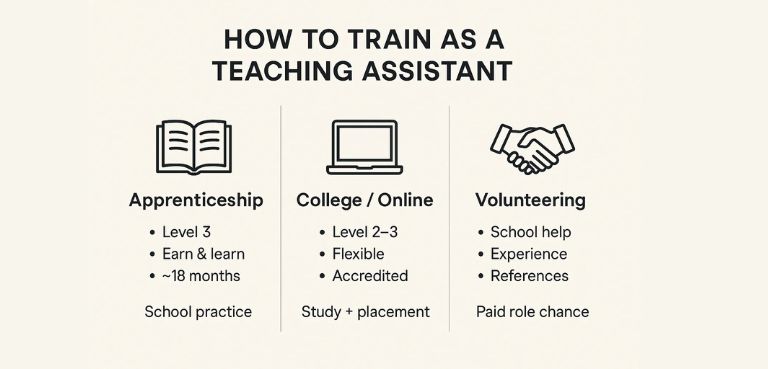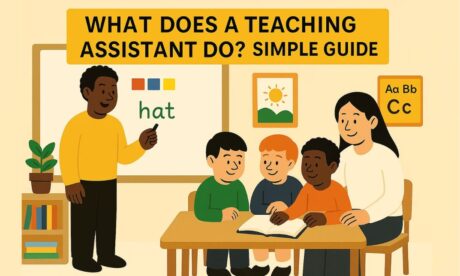Did you know that over 370,000 teaching assistants work in schools in England? That means almost one in four school staff are now TAs. No wonder many people ask, “How can I become a teaching assistant in UK?”
The truth is, teaching assistants aren’t “extras” at all. In fact, they are the backbone of classrooms. TAs give children support, encouragement, and confidence every single day. For example, picture a teacher with thirty busy pupils; you’d quickly think, “They need help!” That help is the TA: steady, caring, and always essential.
Becoming a TA isn’t just about forms or requirements—it’s about people. The role combines patience, teamwork, and kindness with a strong emphasis on problem-solving. Yes, it can be challenging, but the rewards are unforgettable daily. You’ll see magical moments when children understand something for the first time. The path is simple, clear, and open to complete beginners. Want to learn the steps, routes, and chances to start today? So, keep reading this article, because your own TA journey could begin right here.
What is a teaching assistant? (role, purpose & where you’ll work)

A teaching assistant (often called a TA, LSA, or classroom assistant) provides daily support to teachers and pupils. In simple terms, what is a teaching assistant? They are trusted helpers who support children to learn, grow, and do well. Instead of being “extras”, TAs are the backbone of classrooms today. They guide pupils, encourage independence, and make lessons accessible for everyone.
What Do Teaching Assistants Do?
So, what do teaching assistants do each day in school? Their work changes depending on the class, subject, and pupil needs. For example, they may listen to children read or run small groups. They often support one‑to‑one with pupils who need extra help. Many teach key skills like phonics, spelling, and basic maths. TAs also prepare resources, supervise at lunch, and join on school trips. They provide that extra pair of hands so children never fall behind.
What are the teaching assistant’s responsibilities?
Now, let’s look at what teaching assistant responsibilities are. The list is long, but always focused on pupil success. To begin with, TAs reinforce learning during lessons and encourage pupils to keep trying. They model positive behaviour and help children build confidence each day. They also prepare materials, organise displays, and sometimes keep records for teachers. In specialist roles, they adapt resources or follow support plans for a child. Every responsibility has one aim: making learning fair, focused, and accessible.
What is the Role of a Teaching Assistant?
Finally, what is the role of a teaching assistant overall? The role exists to bridge the gap between teacher and pupil needs. Teachers lead the class, but TAs make sure individuals keep up. They focus on inclusion, ensuring every child feels supported and accepted. Most importantly, they nurture pupils’ independence so children grow more confident each day. The role is about learning, but it’s also deeply about care. TAs are not just staff; they are steady allies for children.
Why This Role Matters
Schools would struggle without the support of teaching assistants. Teachers need time to plan, and TAs give them that space. Pupils need encouragement, and TAs give them patience, kindness, and hope. In truth, the impact of a TA often lasts far beyond school years. From small victories in reading to bigger leaps in confidence, every milestone matters. Being a TA is challenging, but the rewards make it unforgettable.
Therefore, the next time you wonder, “What is a teaching assistant, and what makes them important?” remember this: they are essential, caring, and at the very heart of education.
How Can I Become a Teaching Assistant in UK?

Most often, people ask about teaching assistant requirements before starting this career. Schools want staff who can support pupils safely and effectively.
Do I Need Qualifications to Be a Teaching Assistant?
The simple answer is not always. There are no strict national rules. However, most schools ask for GCSE English and Maths at grade 4 (C) or above. You’ll also need a DBS check to work with children. So, “Do I need qualifications to be a teaching assistant?” Technically, no, but schools do prefer them.
What Qualifications Do I Need to Be a Teaching Assistant?
So, “What qualifications do I need to be a teaching assistant?” The most common are Level 2 or Higher Level Teaching Assistant and Learning certificates. Another option is the Level 3 Teaching Assistant Apprenticeship, which lets you earn while you train. Extra courses like paediatric first aid or safeguarding are also very useful.
What Do You Need to Be a Teaching Assistant?
To sum up, what do you need to be a teaching assistant? You’ll need GCSEs, a DBS check, and good references. Level 2 or 3 training makes you more employable. Just as important are patience, kindness, and great communication skills. With those, you’re ready to begin this rewarding career.
How do I train to be a teaching assistant?

Many people ask, “How to train to be a teaching assistant?” The good news is that there are simple routes you can follow. You don’t always need experience, and training options are flexible and beginner‑friendly.
1. Apprenticeship Route
One popular route is the Level 3 Teaching Assistant Apprenticeship. It’s great if you want to earn while you learn. The course usually takes around 18 months to finish. During that time, you’ll work in a school and study part‑time. The training is often fully funded, so you avoid tuition costs. This route is especially good if you ask, “How to become a teaching assistant without experience?” You’ll get real classroom practice while building skills step by step.
2. College or Online Courses
Another pathway is through a college or online course. City & Guilds, for example, offers the 5329 Supporting Teaching and Learning suite. These are Level 2 and Level 3 qualifications. Courses teach you child development, support strategies, and classroom skills. Many programmes mix study with classroom placements, so you still gain real practice. You can also learn affordable CPD-certified online courses from Unified Course. Online options create flexibility if you need to balance study with work.
3. Volunteering in Schools
If you’re wondering “how to become a teaching assistant with no experience”, volunteering is a great option. Many schools welcome extra help for reading, small groups, or playground duty. Volunteering gives you valuable experience and school references. It’s also a real chance to test the role before training. Often, schools later offer paid positions to their reliable volunteers.
Putting It Together
So, “how do I train to become a teaching assistant?” You can choose an apprenticeship, take a college or online course, or begin by volunteering. Each route gives you essential skills, confidence, and classroom experience. The important thing is starting. Every step you take gets you closer to a career that changes lives, including your own.
Teaching Assistant Roles & Levels (L2, L3, HLTA)
There are many teaching assistant roles in schools across the UK. Some give general classroom support, helping with lessons, activities, and pupil focus. Others work as SEN teaching assistants, supporting children with special educational needs one‑to‑one. Many are EYFS TAs, working with young children in nursery and reception. Schools also use intervention TAs, leading groups for reading, maths, or phonics. Finally, pastoral TAs support behaviour, well‑being, and emotional needs during the school day.
What is a Level 2 Teaching Assistant?
So, what is a level 2 teaching assistant? A Level 2 TA usually supports the teacher directly in lessons. They prepare resources, set up activities, and guide pupils during tasks. Often, they listen to reading, lead small groups, or reinforce learning. It’s an entry‑level role, great for people starting out. Schools usually ask for GCSE English and Maths at grade 4. A Level 2 Supporting Teaching and Learning qualification is also commonly preferred.
What is a Level 3 Teaching Assistant?
Now, what is a level 3 teaching assistant? A Level 3 TA takes on more independence and responsibility. They may run interventions, adapt resources, or supervise larger pupil groups. Many support pupils with additional needs, often one‑to‑one or in small sessions. They work with less supervision, so confidence and initiative are important. Most schools expect a Level 3 Diploma in Supporting Teaching and Learning. This qualification prepares you for deeper involvement in lessons and pupil progress.
What is a Higher Level Teaching Assistant (HLTA)?
What is a higher-level teaching assistant? An HLTA role goes beyond standard classroom support. They can lead learning, guide activities, and sometimes cover entire classes. They also help teachers with planning, assessment, and subject knowledge delivery. Pay is higher, reflecting their extra responsibility and leadership. So, how do I become a higher-level teaching assistant? You’ll need experience as a TA, training supported by your school, and successful completion of HLTA assessments recognised nationally.
Whether you’re starting at Level 2, moving to Level 3, or asking, “How do I become a higher-level teaching assistant?” There’s a clear path. With training, patience, and experience, you can progress while supporting pupils every day.
Finally, keep growing and aim for HLTA status; it’s your pathway to better pay, more responsibility, and a fulfilling career helping children thrive! You can start today with the HLTA Course at Unified Course and gain the skills you need to shine in any classroom!
Teaching assistant salary (UK)
It’s common to ask about the teaching assistant’s salary before starting this role. Pay is set mainly by local councils using NJC pay scales. From April 2025, most councils will start new TAs at £24,413 full‑time equivalent (FTE) on scale point 2. The April 2025 pay award added 3.2% to pay scales and allowances.
How Much Does a Teaching Assistant Earn?
So, how much does a teaching assistant earn yearly? On average, the starting salary is about £24,400 FTE (Full-time equivalent). This means if you work full-time, year‑round, you earn that figure. However, most contracts are term‑time only, so pay is pro‑rata (reduced to match school weeks). That is why TA pay looks lower when advertised.
How Much Do Teacher’s Assistants Get Paid Per Hour in the UK?
Next, how much do teachers assistants get paid per hour in the UK? Using the April 2025 figures, the hourly pay is around £12.65 at the entry level. Rates can rise with seniority, SEN roles, or regional weighting. Pay can vary slightly across different local councils.
Do Teaching Assistants Get Paid for Holidays?
Many ask, do teaching assistants get paid for holidays? The answer is yes, but not as extra pay. Contracts are term‑time only, with pay spread across 12 months. Holiday entitlement is calculated pro rata under the national Green Book agreement. So your monthly pay already includes your holiday pay entitlement.
How Many Hours Do Teaching Assistants Work?
Finally, how many hours do teaching assistants work weekly? Most follow the school timetable, often 25–32 hours each week. Hours can include lesson support, playground duty, and after‑school meetings. Some secondary school TAs work slightly longer days to cover timetables.
How to become a SEN teaching assistant

Some of you may ask, “How to become a SEN teaching assistant?” It’s a rewarding role where you support pupils with special needs such as autism, speech difficulties, behaviour challenges, or medical conditions. Each day brings a chance to make learning easier and more meaningful. To do well, you’ll need patience, empathy, and hands-on skills that grow with experience.
Training and Skills
Most schools want you to have GCSEs in English and Maths. Doing a Level 2 or Level 3 teaching assistant course helps you learn the basics. Also, volunteering in schools gives you practice and builds your confidence. Step by step, this gets you ready to work as an SEN assistant.
Pay and Allowances
Now, let’s talk money. “How much does an SEN teaching assistant earn?” Pay follows the national NJC scale set by local councils. From April 2025, starting full-time pay is around £24,413 FTE. However, most jobs are term-time only, so your salary is worked out on a pro-rata basis. Some councils and academies also add SEN allowances, which can increase your total pay.
If you’re wondering, “How much does a special needs teaching assistant earn?” The figure is quite similar, though allowances can make it higher. As you gain experience or move up to HLTA level, your pay rises too, rewarding both your skills and dedication.
How do I become a higher-level teaching assistant?
You may be wondering, “How do I become a higher level teaching assistant?” The path is clear but requires some experience first. You usually need to work as a teaching assistant before applying. Then, with your school’s support, you can take the HLTA status assessment. This assessment checks your skills against national standards for leading learning.
What is a HLTA Qualification?
Let’s clear this up. “What is a HLTA qualification?” It is not a traditional course but a status. You show evidence of planning lessons, leading groups, and assessing pupils. If successful, you gain HLTA recognition, which is accepted across schools in England.
What Can HLTAs Do?
So, what makes this role different? HLTAs can lead activities, run interventions, and cover classes. However, they only cover full classes when teachers provide the plans. They cannot replace teachers completely but they can step up more often.
What is the Difference Between TA and HLTA?
Now, “What is the difference between TA and HLTA?” A TA mainly supports learners under teacher guidance. An HLTA works more independently and may deliver lessons. In short, an HLTA holds extra responsibility and receives higher pay.
What is the Difference Between Level 1, 2 and 3 Teaching Assistants?
You may also ask, “What is the difference between Level 1, 2 and 3 teaching assistants?” Level 1 offers basic support under close supervision. Level 2 helps with small groups, reading, or numeracy. Level 3 takes more independence with one‑to‑one support and interventions. HLTA then sits above as the most advanced level.
What is the highest level for a teaching assistant?
Finally, “What is the highest level for a teaching assistant?” The answer is HLTA. It is the top level before moving into teacher training.To progress, gain school experience, take the HLTA status assessment, and get support from your employer. In short, HLTA is the highest level for teaching assistants today. It allows you to lead learning, cover classes, and earn more.
So if you’re aiming higher, the pathway is clear.
Can a Teaching Assistant Become a Teacher without a Degree?
Many ask, “Can a teaching assistant become a teacher without a degree?” The answer is no. To gain Qualified Teacher Status (QTS), you need one. However, there are pathways once you finish a degree. You can train through a PGCE in Early Years Education Course or a teaching apprenticeship. If you lack GCSE English, Maths, or Science, equivalency tests are available. So the route is clear: finish your GCSEs, gain a degree, then apply for teacher training.
How to Become a Teacher from Teaching Assistant
So, “How to become a teacher from a teaching assistant?” First, build school experience, which you already have as a TA. Next, complete a degree if you don’t hold one. Finally, enter training programmes like School Direct, PGCE, or apprenticeships that lead to QTS. Experience as a TA gives you a strong advantage.
Can a TA Teach a Class?
Another question is, “Can a TA teach a class?” Normally, no. TAs only support a teacher’s work directly.
Higher Level Teaching Assistants (HLTAs) can lead learning in defined situations. They may deliver lessons planned by teachers or cover classes temporarily. However, they cannot take full responsibility like a qualified teacher. So, TAs can support classes, but qualified teachers keep overall responsibility.
Skills & Strengths: How to be a good teaching assistant
So, “How to be a good teaching assistant?” First, you need strong communication. Good TAs listen, explain clearly, and encourage pupils daily. Next, you need behaviour support skills to keep lessons calm and focused. Safeguarding knowledge is also essential because pupil safety is always the top priority. Finally, inclusion is vital; you must help every child feel part of learning.
What Skills Do You Gain from Being a Teaching Assistant?
Many people ask, “What skills do you gain from being a teaching assistant?” You develop collaboration with teachers and staff. You improve your assessment skills by reviewing students’ progress and identifying gaps. Also learn strategies for supporting SEND pupils, such as adapting activities or calming behaviours. These skills are useful in many education roles and beyond.
What Are the Strengths of a TA?
Another question is, “What are the strengths of a TA?” Patience and empathy are clear strengths. Adaptability is another, as you adjust quickly to pupils’ needs. Reliability and consistency also stand out. Together, these qualities make a TA dependable in every classroom.
Why Do People Become TAs?
So, “why do people become TAs?” Many want to help children succeed. Others enjoy working in schools without the responsibilities of full teaching. For some, it’s also a stepping stone to becoming a teacher.
Is Being a TA Beneficial?
Next, “Is being a TA beneficial?” Absolutely. You gain experience, transferable skills, and the chance to build relationships with pupils. It’s beneficial for personal growth and future career opportunities.
What is the Advantage of TA?
Finally, “What is the advantage of TA?” The real advantage is impact. TAs help pupils learn, grow, and achieve daily. They also support teachers, making classrooms run smoothly and effectively.
Compliance & Safeguarding (DBS, policies, Ofsted expectations)
Safeguarding is central to every school role. As a teaching assistant, you need a DBS check, safeguarding training, and a clear awareness of your duty of care. Schools expect you to know policies, follow safeguarding procedures, and act quickly if concerns arise.
What Does Ofsted Say About Teaching Assistants?
Many ask, “What does Ofsted say about teaching assistants?” Ofsted uses guidance from the Education Endowment Foundation (EEF). This stresses that TAs must be deployed carefully to boost pupil progress. In other words, schools should not use TAs as substitutes for teachers. Instead, TAs should provide targeted, evidence‑informed support, usually in small groups or one‑to‑one.
What Questions Will Ofsted Ask Staff?
So, “What questions will Ofsted ask staff?” Teaching assistants may be asked about safeguarding steps, school policies, or how they support learning. Inspectors want to see that TAs know procedures, understand their role, and put pupil safety first.
Can a Teaching Assistant Refuse to Work with a Child?
Sometimes the question comes up: Can a TA refuse to work with a child? The answer depends on safeguarding or risk concerns. If a child’s behaviour poses genuine danger, you should follow school policy. Concerns must be escalated to the Senior Leadership Team (SLT). Schools will then provide appropriate adjustments, support, or supervision.
Benefits & Discounts
Working as a TA brings more than classroom experience. There are also benefits, protections, and some handy discounts. Let’s break them down.
Do TAs Get Sick Pay?
First, many ask, “Do TAs get sick pay?” The answer is yes under most local authority contracts. These follow the Green Book agreement, which includes paid sick leave that grows with service. However, not all academies or trusts follow this, so always check your contract carefully.
Do Teaching Assistants Get a Blue Light Card?
Next, “Do teaching assistants get a blue light card?” Yes, they do. Education staff are now eligible to apply. The card gives discounts on shopping, travel, eating out, and even holidays. Alongside this, some education‑sector discount schemes are also available. These perks help you save money throughout the year.
What Other Jobs Can Teaching Assistants Do?
Finally, “What other jobs can teaching assistants do?” The skills transfer well into other careers. Many move into childcare, behaviour support, youth work, or SEN roles. Some also train as teachers, using their classroom experience as a strong foundation.
Training & Costs Snapshot
If you want to be a TA, training is your first step. Luckily, there are flexible and affordable options to choose from.
Common TA Course Options
The most popular courses are the Level 2 and Level 3 Teaching Assistant qualifications. They teach child development, safeguarding, and classroom skills. Another option is the Level 3 Teaching Assistant Apprenticeship. This lets you work in a school while studying at the same time.
What Does a Teaching Assistant Course Cost?
You may ask, “What does a teaching assistant course cost?” The answer depends on the provider and course level. College or online courses can cost a few hundred to a few thousand pounds. Apprenticeships are usually fully funded, so you won’t need to pay for training. Always check course fees with your chosen provider.
If you’re thinking about becoming a teaching assistant or moving up the levels, online course providers like Unified Courses make it easier than ever. They offer affordable and flexible online courses, so you can learn at your own pace. Many of their programmes are also accredited and often available on sale, giving you both value and recognised qualifications.
Time Commitment
Training takes time, but it varies by route. An apprenticeship normally lasts about 18 months. College or online courses often take six to twelve months part‑time. You will balance schoolwork with some off‑the‑job study.
Free CPD and Extra Learning
After qualifying, you can still grow through free training. Schools, local councils, and charities often offer CPD (Continuing Professional Development). These sessions cover topics like safeguarding, behaviour, or SEND. They are a free way to build skills.
FAQs
1. What qualifications do you need to be a teaching assistant in the UK?
Most schools expect GCSEs in English and Maths at grade 4/C or above, plus many prefer applicants with a Level 2 or Level 3 Teaching Assistant qualification, safeguarding training, and an up‑to‑date DBS check.
2. How to apply for a teaching assistant job in the UK?
You can search and apply through local council job boards, school websites, and national sites like TES; make sure your CV highlights childcare, education, or support roles, and be prepared for safeguarding and behaviour management questions during interviews.
3. Can you be a TA with no experience?
Yes, it is possible, but schools strongly prefer candidates with some experience; volunteering in schools, nurseries, or youth clubs helps build confidence, proves commitment, and often leads to paid TA positions.
4. How much is a TA qualification?
Course costs vary widely: a Level 2 TA course may cost £300–£800, and a Level 3 course anywhere between £500–£1,500, while a Level 3 Apprenticeship is fully government‑funded, so it is free for learners.
5. How to become a teaching assistant with no experience in the UK?
The best route is to volunteer in a school to gain classroom hours, complete an entry‑level qualification like Level 2 Supporting Teaching and Learning, and apply for school roles highlighting transferable skills such as communication and teamwork.
6. What is the salary of a teaching assistant in the UK?
From April 2025, new TAs usually start at about £24,413 full‑time equivalent on NJC pay scales, but most roles are term‑time only and paid pro‑rata, averaging around £12–13 per hour depending on location and allowances.
7. How long is a teaching assistant course?
A Level 2 TA qualification normally takes 6–9 months part‑time, a Level 3 certificate or diploma can take 12–18 months, and a Level 3 apprenticeship usually lasts around 18 months with combined school work and study.
8. Are Level 3 courses free?
Yes, if you take the apprenticeship route, the government funds the course fully; if you study at college or online, you may need to pay fees unless you qualify for financial support based on age, income, or local grants.
Wrap-Up: Your next steps
Still wondering, how can I become a teaching assistant in UK? Start by picking your path—an apprenticeship or a Level 2/3 course. Gather your DBS and references, then craft a CV that clearly shows your dedication to helping children learn.
Then, take the next step with the Teaching Assistant Course at Unified Course. It’s easy to follow, flexible, and full of practical skills to help you feel confident in a real classroom.




